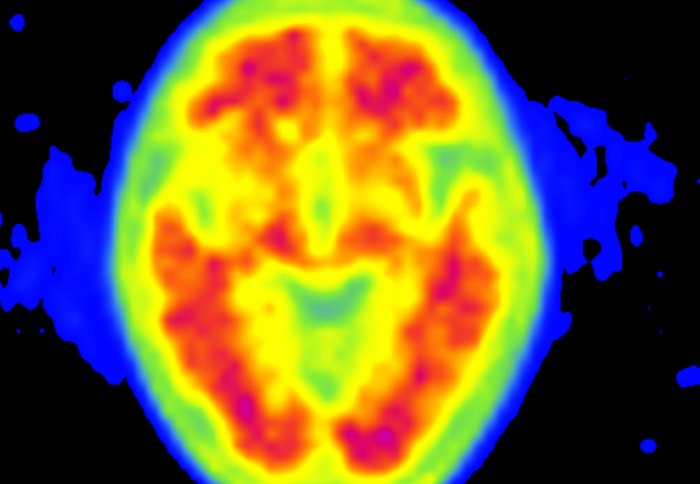Three ways Imperial is leading the way in dementia research

An amyloid PET scan of a patient suffering from Alzheimer's disease. Image credit: Dr Zarni Win.
As part of Brain Awareness Week (13 - 19 March), we spoke to three pioneering Imperial researchers who are advancing the field of dementia research.
Dementia comes in a number of different forms, encompassing a broad range of progressive neurological disorders. In the UK, the most common type is Alzheimer’s disease, which affects 62% of those diagnosed with dementia.
The ways in which a patient might be affected are diverse, but dementia is most often characterised by memory and communication problems, and impaired cognitive ability. For instance, an individual suffering from dementia may have difficulty making sense of time and place.
There are currently 850,000 people living with dementia in the UK.
We asked three researchers to explain how their work is changing the landscape of dementia care.
1) Developing an effective drug for Alzheimer’s – Dr Paresh Malhotra
The drugs currently approved for the treatment of Alzheimer’s disease have a very small effect on thinking and quality of life. Most of these treatments work by increasing levels of acetylcholine, the neurotransmitter, or "chemical messenger", most closely linked with memory. Acetylcholine pathways are disrupted in Alzheimer’s disease, but there is clear evidence that the noradrenaline system is also disrupted. Noradrenaline acts as the main neurotransmitter of the cardiovascular system's fight-or-flight nerves. It appears to have a particularly important role in general arousal and attention, which are affected soon after memory in the progression of Alzheimer's disease.
We are about to begin a randomized controlled trial to assess whether boosting noradrenaline, in addition to standard treatment, will improve attention and more general aspects of thinking in patients with Alzheimer’s disease. The NorAD trial is funded by the NHS National Institute of Health Research, and the drug we will be evaluating is called Guanfacine. Guanfacine has been shown to boost attention and memory in animal studies and in healthy humans, and is licensed for the treatment of Attention Deficit Hyperactivity Disorder (ADHD).
We will recruit 160 Alzheimer’s patients, and will compare the effects of standard therapy alone versus combination therapy (standard treatments + Guanfacine). If we find that Guanfacine improves cognition in combination with standard treatment, this would lead to a new approach to treating this extremely common and devastating disease.
2) Finding new therapies to protect the ageing nervous system – Dr Magdalena Sastre
The major focus of my research is understanding interactions between neurobiology and the body’s defence mechanisms, in relation to the degeneration of the nervous system and ageing. I’m studying the molecular mechanisms through which inflammation impacts on the deterioration of neurons as the body ages. Essentially, neurons are cells that transmit vital information through electrical or chemical signals, and tell our body to move and feel, among other things.
In Alzheimer's, a plaque builds up in a patient's brain, and the main component of this extracellular material is a kind of peptide called amyloid-β (Aβ). I have been specifically investigating how this peptide might damage neurons by causing toxicity and inflammation in the nervous system.
I take a multidisciplinary approach in my research, using molecular/cell biology, pharmacological imaging and biochemical techniques. In particular, we investigate new therapies based on their anti-inflammatory and neuroprotective effects (in other words, their ability to protect nerve cells against damage), including growth factors and new gene therapies.
3) Exploring cell transplantation in Parkinson’s disease – Professor Paola Piccini
Parkinson’s disease (PD) is a common and currently incurable neurodegenerative disease; patients develop dementia as a late complication of the condition. The defining symptoms of Parkinson's are bradykinesia (slowness), rigidity and a resting tremor. These symptoms have historically been attributed to a decline of dopamine input from the substantia nigra to the striatum, two parts of the brain that play a key role in movement. Symptoms can initially be managed using drugs and surgical procedures that increase the availability of dopamine. However, these treatment options do not replace or stop dopamine-producing cells from dying.
One of the most promising therapies in Parkinson’s patients has been dopamine cell transplantation. Previous attempts in the nineties have revealed highly promising results, in many cases subduing symptoms for up to 20 years after the procedure whilst allowing reductions in medication requirements. However, other patients did not derive obvious clinical benefit and several developed dyskinesia, a phenomenon characterised by increased but uncontrollable movement.
To understand this variability, Imperial College London has joined forces with Cambridge, UCL, and several European universities. We are currently running a clinical trial that looks at using an extensive neuroimaging battery to tap into several aspects of the brain, in patients who are undergoing a modified and updated transplantation procedure. The neuroimaging battery is also designed to look into aspects of serotonin function, the structural and functional connectivity of the brain, and the activity within the motor network during movement.
We hope to better understand what it is that defines the success or failure of intervention, and what the side effects are on the body’s nervous system. Ultimately, we want to know how we should approach the development of cell-based interventions in the future as a routine clinical treatment.
Article supporters
Article text (excluding photos or graphics) © Imperial College London.
Photos and graphics subject to third party copyright used with permission or © Imperial College London.
Reporter
Ms Genevieve Timmins
Academic Services